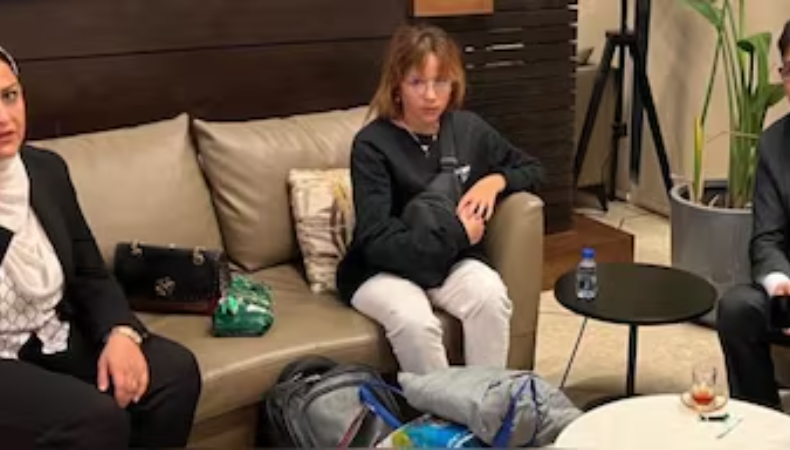From TikTok to Freedom: The Incredible Rescue of Fawzia Amin Seydou from Isis Captivity

One TikTok video sticks out as a moving appeal for aid that turned into an incredible rescue effort in a time when social media can magnify voices and organize support. The narrative of young Yazidi woman Fawzia Amin Seydou not only clarifies the atrocities suffered by modern slavery victims but also emphasizes the amazing efforts of those ready to traverse geopolitical boundaries to save lives.
A Childhood Disturbed by Violence
At just eleven years old, Fawzia’s life was permanently changed when she was abducted during the horrific campaign of the Islamic State in Iraq. Seizing control of vast sections of the nation in 2014, the terrorist organization committed terrible atrocities on the Yazidi population. Fawzia was kidnapped in Sinjar during this turbulent period when Isis fighters mercilessly massacred men and kidnapped thousands of young women and girls, turning them into sex slaves. Her childhood vanished, thrown into a world of violence and terror no child should ever live.
Fawzia endured terrible agony under the control of her captors almost ten years ago. She was forced to wed a fighter more than ten years her senior, sexually assaulted and raped on a regular basis. Fawzia’s stories expose the psychological suffering she went through and show how she was treated more like a property than a human being. She was moved to the infamous Al-Hawl camp for Isis spouses, a facility noted for its overcrowding and appalling circumstances, following the murder of her husband in battle between Isis and Kurdish troops in 2018.
The fearless TikTok Plea
In September 2023, Fawzia mustered the bravery to ask for assistance among this terrible life. She shared a moving video on TikTok asking people to get in touch with Nobel Laureate Nadia Murad, a Yazidis campaigner who has been a vocal advocate for the rights of Yazidis women. She carried the weight of her anguish in her passionate plea: “I’m terribly fatigued. Their ladies and children bother me as well; it is not only their guys. They could attack me, kill me. It is quite overpowering. Deeply resonating with her suffering, this courageous deed attracted attention and, miraculously, found her mother, who had long thought Fawzia dead.
The Value of Humanitarian Work and Activism
The dire appeal for aid from Fawzia set off a chain reaction of campaigners and humanitarian volunteers set to save her. Among them was Steve Maman, a Moroccan-Canadian businessman well-known for his efforts in freeing Yazidis from Isis captivity. Dubbed the “Jewish Schindler,” Maman had earlier saved more than 140 women and girls and shown relentless dedication to Fawzia’s cause. Quickly organizing tools and support, he highlighted the value of community in tackling humanitarian emergencies and the might of grassroots movement.
There were difficulties in the rescue operation as well. Given Israel’s lack of diplomatic ties to Iraq, the geopolitical scene complicates things. But Maman’s will was stronger. Using a picture of Fawzia obtained during one of their Skype conversations, he put great effort to obtain a temporary travel document for her through the Iraqi consulate in Jordan. Emphasizing that compassion should come first over political disagreements when a young daughter’s life is in risk, his relentless campaign included lobbying in the Israeli Knesset for her release.
An Organized Effort Under Pressure
The real rescue effort for Fawzia was a difficult one needing careful preparation and coordination among several groups. Making contact with Fawzia, Brigadier-General Elad Goren and his Israeli Defense Forces (IDF) team sought to find the best approach to enable her escape. After looking at several choices—including sending an IDF soldier to guard her—they finally chose to send a reliable Gazaite servant to pick her up.
Early on October 1, Fawzia was told to be ready for an exciting trip toward freedom. She was nervous. Under close observation, drones tracked her path to make sure she stayed away from areas under control of Hamas and criminal groups. From a control room, Goren directed the operation while considering the fine equilibrium between guaranteeing Fawzia’s safety and the continuous violence in the area.
Although Fawzia’s rescue represented a turning point in her life, it also threw a pall on her return. Two months before her release, she found out that her father passed—a heart-wrenching tragedy that highlighted the severe scars left by years of war. Born into captivity, her two children stayed behind as a terrible reminder of the life she had been compelled to live. In her narrative, Fawzia clearly shows her love for her children as she negotiates the reality of leaving them in a vulnerable state.
Finally: An Account of Resilience and Hope
The path Fawzia Amin Seydou takes from imprisonment to freedom is a potent monument to the fortitude of the human spirit and the ability for compassion among hardship. Her narrative calls to action for all of us as well as clarifies the horrors experienced by many people caught in contemporary slavery. It underlines the crucial need of increasing knowledge of violations of human rights and of ongoing activism on behalf of the weaker people.
While we consider Fawzia’s amazing rescue, we also have to be alert and dedicated to helping projects aiming at releasing people trapped in silence. We can help to create a future in which nobody is left behind and where everyone values and defends their right to freedom by elevating their voices and encouraging international cooperation.




